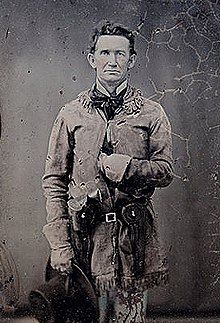John Salmon Ford | |
|---|---|
 CSA Colonel John S. Ford during the American Civil War | |
| Member of the Texas Senate | |
| In office January 20, 1852 – November 7, 1853 | |
| Preceded by | Edward Burleson |
| Succeeded by | Elliott McNeil Millican |
| Constituency | 21st district |
| In office April 18, 1876 – August 30, 1879 | |
| Preceded by | Joseph E. Dwyer |
| Succeeded by | Stephen Powers |
| Constituency | 29th district |
| Mayor of Brownsville | |
| In office 1874 | |
| 12th Mayor of Austin | |
| In office 1854–1855 | |
| Preceded by | William P. DeNormandie |
| Succeeded by | John T. Cleveland |
| Personal details | |
| Born | May 26, 1815 Greenville District, South Carolina, U.S. |
| Died | November 3, 1897 (aged 82) San Antonio, Texas, U.S. |
| Spouse | Mary Davis |
| Occupation | Military officer, doctor, lawyer, journalist, politician |
| Awards | Hall of Honor |
| Nickname | "Rip" |
| Military service | |
| Allegiance | |
| Branch/service | Texas Militia |
| Rank | Brigadier General (Militia) |
| Unit | Regiment of Texas Mounted Rifles Texas Rangers |
| Commands | Texas Scout Company (Mexican–American War), 2nd Texas Cavalry Regiment (CSA) |
| Battles/wars | Indian Wars *Antelope Hills Expedition (1859) *Battle of Little Robe Creek (1859) Merchant's War (1851–1852) Mexican–American War First Cortina War *Battle of Rio Grande City (1859) American Civil War *Second Cortina War (1861) *Battle of Palmito Ranch (1865) |

John Salmon Ford (May 26, 1815 – November 3, 1897), better known as "Rip" Ford, was a member of the Republic of Texas Congress and the Texas Senate. He was also the mayor of Brownsville and Austin. Ford was a Texas Ranger, a Confederate colonel, a doctor, a lawyer, and a journalist and newspaper owner. He commanded men during the Antelope Hills expedition and later led the Confederate forces in what was arguably the last engagement of the American Civil War, the Battle of Palmito Ranch on May 12–13, 1865. It was a Confederate victory, but as it occurred more than a month after Robert E. Lee's surrender, it did not affect the war's outcome.
